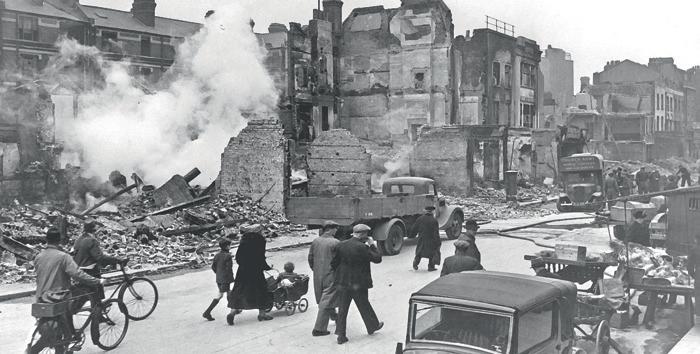
Eighty-two years ago, the blitz reached its deadly climax. For eight months, from September 1940 until May 1941, Hitler’s Luftwaffe, having been defeated in the Battle of Britain, pummelled the country’s towns and cities in nightly terror raids in a bid to break the will of the people to continue the war.
The German night bomber offensive began on 7 September, with a raid by 350 aircraft on London, which killed more than 400 people. For the next 57 days the capital would be attacked night after night without respite. At the time, prime minister Winston Churchill famously declared: “London can take it.” Privately, however, the PM was deeply concerned about the damaging effect the Luftwaffe’s unrelenting onslaught was having on civilian morale.
The public, he realised, was particularly disconcerted by the apparent lack of any effective defence being mounted against the nocturnal raiders, who seemed able to bomb London and other cities with near impunity. Britain’s anti-aircraft batteries could only fire blindly into the night sky and hope for a lucky hit, which they very seldom achieved.
As for the RAF’s Fighter Command, which had performed so magnificently in daylight during the summer of 1940, winning the Battle of Britain and thereby ending the threat of Nazi invasion, it appeared powerless to counter the enemy at night. Indeed, the risk of being shot down while bombing British cities during the blitz was so low, and German casualties so few, that Luftwaffe crews habitually referred to operations over the British Isles as “a milk run”.
この記事は Best of British の May 2023 版に掲載されています。
7 日間の Magzter GOLD 無料トライアルを開始して、何千もの厳選されたプレミアム ストーリー、8,500 以上の雑誌や新聞にアクセスしてください。
すでに購読者です ? サインイン
この記事は Best of British の May 2023 版に掲載されています。
7 日間の Magzter GOLD 無料トライアルを開始して、何千もの厳選されたプレミアム ストーリー、8,500 以上の雑誌や新聞にアクセスしてください。
すでに購読者です? サインイン

"A Personal Stab of Shock and Horror"
Chris Hallam looks back on the British reaction to President Kennedy's assassination

A BUILDING BONANZA
Claire Saul samples some of the entries in a new publication from the National Trust

ON TARGET
Russell Cook browses through 50 years of a publishing phenomenon

The Rise and Fall of Poole Pottery
Steve Annandale charts the history of what was, by the 1990s, Dorset's most significant tourist attraction

DOCTOR HO-HO!
Robert Ross takes a swift spin through some of the comedy stars who have stumbled into the Tardis

The Three Ronnies
Martin Handley celebrates the talents of a trio of composers

A RARE OLD SCRAMBLE
Colin Allan has fond memories of tuning in to Grandstand to watch scrambling on winter afternoons in the sport's golden age of the 1960s

THE ULTIMATE RESPONSE
Roger Harvey nominates a sculpture in his native Newcastle as the most poignant and powerful memorial to duty and heroism

POSTCARD FROM CHESHIRE
Bob Barton finds out about subsidence, timber-framed buildings, boat lifts, waterways and Lewis Carroll, taking it all with a pinch of salt

OVER HERE
Michael Foley looks back at how the people of East Anglia reacted to the American \"invasion\" during World War Two that saw the building of dozens of airfields